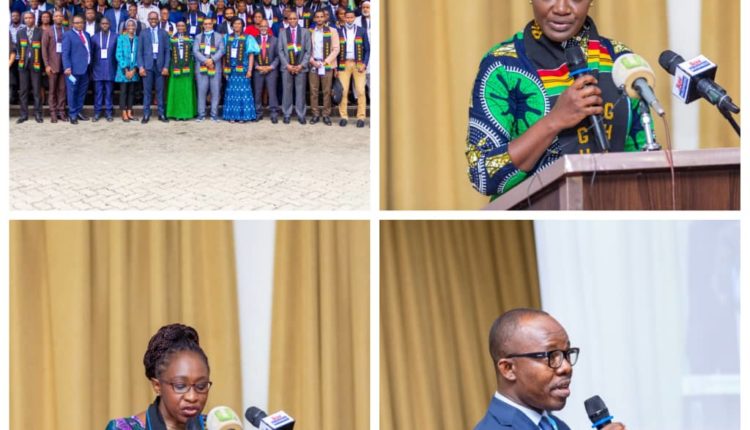Deputy Communications and Digitalisation Minister, Ama Pomaa Boateng has said, the growing problem of cybercrime in Africa requires countries to build effective laws, policies, and international cooperation frameworks together with the aim of solving the issue to the best satisfaction.
Speaking on behalf of sector Minister, Mrs. Ursula Owusu-Ekuful, at the maiden African Union – Global Forum on Cyber Expertise’s (AU-GFCE) Africa Cyber Experts’ (ACE) Community meeting in Accra, Madam Ama Boateng, expressed Ghana’s readiness to support, collaborate and importantly learn from other African states to secure the continent’s digital ecosystem.
“Cybercrime is a trans-border issue and we need an interoperable system – legislations and criminal justice procedures – to better cooperate and respond to the issues through incident reporting, information sharing, investigations and prosecutions.
“Cyberattacks have serious implications on socio-economic development and the national security of our countries. Many of our citizens have experienced cybersecurity incidents including online fraud, online blackmail, online impersonation and identity theft, publication of non-consensual intimate images, unauthorised access, social engineering scams, hacking into protected systems and other cybersecurity-related breaches. A single cybersecurity incident can have global reach and devastating effects on governments, businesses and individuals”.
She added, “The Government of Ghana through the Ministry of Communications and Digitalisation, working closely with other relevant ministries and agencies, international partners and private sector stakeholders, is committed in its efforts to ensure that various digitalisation interventions rolled out are secured. Since cybercrime has no boundaries, and is not limited to one geographical location, we are happy to cooperate with our African partners and stakeholders to further develop our capacity through joint initiatives such as this.”
Elaborating on the interventions the Akufo-Addo administration has achieved through the sustainability and achievements upon cyber related matters, she indicated “the revision of the National Cybersecurity Policy and Strategy to provide a national direction and implementation plan for Ghana’s cybersecurity development; the passage of the Cybersecurity Act, 2020 (Act 1038) to provide a legal basis for cybersecurity development; the institutionalisation of cybersecurity to foster domestic cooperation and collaboration; and the ratification of the Convention on Cybercrime also known as the Budapest Convention; and African Union Convention on Cyber Security & Personal Data Protection also known as the Malabo Convention.
In addition, she revealed government has “also adopted the ECOWAS’ Regional Cybersecurity and Cybercrime Strategy & Regional Critical Infrastructure Protection Policy to strengthen Ghana’s regional and international response in fighting cybercrime and improve on cybersecurity.”
Education
Acting Director-General of the Cyber Security Authority (CSA), Dr. Albert Antwi Boasiako in his welcome address said fighting cybercrime would require a multi-stakeholder approach, with the collaboration of all relevant parties.
“The Republic of Ghana joined the GFCE last year to promote and strengthen capacity building through international collaboration and ultimately to improve our national cyber response and resilience. Hosting this event, therefore, means a lot to us, as it forms part of our national strategy to work with our peers on the continent to improve our collective capacity to mitigate cybercrimes and other cybersecurity challenges.
“As a national institution responsible for cybersecurity matters, I wish to express CSA’s support and commitment to developing this community of Africa Cyber Experts to be able to support our respective governments to address the current state of cyber insecurity being experienced on the continent.”
He added, “I am of the opinion that, the ACE Community meeting will meet its expectations by identifying the capacity building needs of the continent. I believe experts gathered here will also come out with innovative ways of deploying capacity building initiatives, taking into consideration our specific developmental needs and the cyber context of our respective countries. I also wish to recommend the inclusion of African private sector cybersecurity actors in our gatherings to promote public-private sector development of continental capacity building programmes. Capacity building on the continent should be homegrown, developed, and owned by Africans and I believe this group has been established to lead us to achieve these goals.”
Assessment
The head of Economic Integration AUDA-NEPAD, Towela Nyirenda-Jere on her part revealed her outfit has “undertaken assessments in 10 countries using a cybersecurity assessment framework with the support of partners and member states” adding that the “assessment report detailing key and providing recommendations” will take the process to a better stage in cyber-capacity and cybersecurity matters in the continent.
Meeting
The Africa Cyber Experts’ (ACE) Community meeting kicked off at Alisa Hotel, located at North Ridge.
The three-day meeting on Cybersecurity related matters aimed at enhancing and improving security capacity building in the Africa continent.
The program which benefitted about 31 countries with 65 participants also aimed at finding sustainable ways to lead efforts towards a digital Africa among other needed topics.
The countries are Mauritania, Benin, Spain, Serbia, Kenya, Nigeria, AU, Cameroon, Sierra Leone, Republic of Congo, Namibia, Burkina Faso, South Africa, among others.
The meeting was on the theme, setting the scene for cyber security status in Africa. It was also aimed at attracting private sector support from the African Union, in dealing with the threat of cybercrimes on the continent.
It was hosted by the Cyber Security Authority under the Ministry of Communications and Digitalisation, in collaboration with African Union (AU), Global Forum on Cyber Expertise (GFCE) and Africa Union Development Agency (AUDA-NEPAD).




Comments are closed.